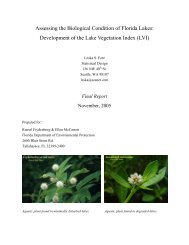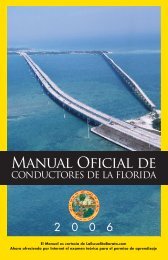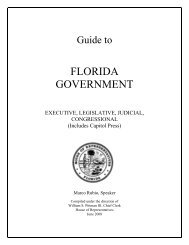Version A final setup - Florida House of Representatives
Version A final setup - Florida House of Representatives
Version A final setup - Florida House of Representatives
You also want an ePaper? Increase the reach of your titles
YUMPU automatically turns print PDFs into web optimized ePapers that Google loves.
ARTICLE I CONSTITUTION OF THE STATE OF FLORIDA ARTICLE I<br />
and cause <strong>of</strong> the accusation, and shall be<br />
furnished a copy <strong>of</strong> the charges, and shall<br />
have the right to have compulsory process for<br />
witnesses, to confront at trial adverse witnesses,<br />
to be heard in person, by counsel or both, and to<br />
have a speedy and public trial by impartial jury in<br />
the county where the crime was committed. If the<br />
county is not known, the indictment or information<br />
may charge venue in two or more counties<br />
conjunctively and pro<strong>of</strong> that the crime was<br />
committed in that area shall be sufficient; but<br />
before pleading the accused may elect in which<br />
<strong>of</strong> those counties the trial will take place. Venue<br />
for prosecution <strong>of</strong> crimes committed beyond the<br />
boundaries <strong>of</strong> the state shall be fixed by law.<br />
(b) Victims <strong>of</strong> crime or their lawful representatives,<br />
including the next <strong>of</strong> kin <strong>of</strong> homicide<br />
victims, are entitled to the right to be informed, to<br />
be present, and to be heard when relevant, at all<br />
crucial stages <strong>of</strong> criminal proceedings, to the<br />
extent that these rights do not interfere with the<br />
constitutional rights <strong>of</strong> the accused.<br />
History.—Am. S.J.R. 135, 1987; adopted 1988; Am. proposed<br />
by Constitution Revision Commission, Revision No. 13,<br />
1998, filed with the Secretary <strong>of</strong> State May 5, 1998; adopted<br />
1998.<br />
SECTION 17. Excessive punishments.—<br />
Excessive fines, cruel and unusual punishment,<br />
attainder, forfeiture <strong>of</strong> estate, indefinite imprisonment,<br />
and unreasonable detention <strong>of</strong> witnesses<br />
are forbidden. The death penalty is an authorized<br />
punishment for capital crimes designated by the<br />
legislature. The prohibition against cruel or<br />
unusual punishment, and the prohibition against<br />
cruel and unusual punishment, shall be construed<br />
in conformity with decisions <strong>of</strong> the United<br />
States Supreme Court which interpret the prohibition<br />
against cruel and unusual punishment<br />
provided in the Eighth Amendment to the United<br />
States Constitution. Any method <strong>of</strong> execution<br />
shall be allowed, unless prohibited by the United<br />
States Constitution. Methods <strong>of</strong> execution may<br />
be designated by the legislature, and a change in<br />
any method <strong>of</strong> execution may be applied retroactively.<br />
A sentence <strong>of</strong> death shall not be<br />
reduced on the basis that a method <strong>of</strong> execution<br />
is invalid. In any case in which an execution<br />
method is declared invalid, the death sentence<br />
shall remain in force until the sentence can be<br />
lawfully executed by any valid method. This<br />
section shall apply retroactively.<br />
History.—Am. H.J.R. 3505, 1998; adopted 1998; Am. H.J.R.<br />
951, 2001; adopted 2002.<br />
SECTION 18. Administrative penalties.—<br />
No administrative agency, except the Department<br />
<strong>of</strong> Military Affairs in an appropriately<br />
convened court-martial action as provided by<br />
law, shall impose a sentence <strong>of</strong> imprisonment,<br />
B–4<br />
nor shall it impose any other penalty except as<br />
provided by law.<br />
History.—Am. proposed by Constitution Revision Commission,<br />
Revision No. 13, 1998, filed with the Secretary <strong>of</strong> State May<br />
5, 1998; adopted 1998.<br />
SECTION 19. Costs.—No person charged<br />
with crime shall be compelled to pay costs before<br />
a judgment <strong>of</strong> conviction has become <strong>final</strong>.<br />
SECTION 20. Treason.—Treason against<br />
the state shall consist only in levying war against<br />
it, adhering to its enemies, or giving them aid and<br />
comfort, and no person shall be convicted <strong>of</strong><br />
treason except on the testimony <strong>of</strong> two witnesses<br />
to the same overt act or on confession in open<br />
court.<br />
SECTION 21. Access to courts.—The<br />
courts shall be open to every person for redress<br />
<strong>of</strong> any injury, and justice shall be administered<br />
without sale, denial or delay.<br />
SECTION 22. Trial by jury.—The right <strong>of</strong><br />
trial by jury shall be secure to all and remain<br />
inviolate. The qualifications and the number <strong>of</strong><br />
jurors, not fewer than six, shall be fixed by law.<br />
SECTION 23. Right <strong>of</strong> privacy.—Every<br />
natural person has the right to be let alone and<br />
free from governmental intrusion into the person’s<br />
private life except as otherwise provided<br />
herein. This section shall not be construed to<br />
limit the public’s right <strong>of</strong> access to public records<br />
and meetings as provided by law.<br />
History.—Added, C.S. for H.J.R. 387, 1980; adopted 1980;<br />
Am. proposed by Constitution Revision Commission, Revision<br />
No. 13, 1998, filed with the Secretary <strong>of</strong> State May 5, 1998;<br />
adopted 1998.<br />
SECTION 24. Access to public records<br />
and meetings.—<br />
(a) Every person has the right to inspect or<br />
copy any public record made or received in<br />
connection with the <strong>of</strong>ficial business <strong>of</strong> any public<br />
body, <strong>of</strong>ficer, or employee <strong>of</strong> the state, or<br />
persons acting on their behalf, except with<br />
respect to records exempted pursuant to this<br />
section or specifically made confidential by this<br />
Constitution. This section specifically includes<br />
the legislative, executive, and judicial branches<br />
<strong>of</strong> government and each agency or department<br />
created thereunder; counties, municipalities, and<br />
districts; and each constitutional <strong>of</strong>ficer, board,<br />
and commission, or entity created pursuant to<br />
law or this Constitution.<br />
(b) All meetings <strong>of</strong> any collegial public body<br />
<strong>of</strong> the executive branch <strong>of</strong> state government or <strong>of</strong><br />
any collegial public body <strong>of</strong> a county, municipality,<br />
school district, or special district, at which
















